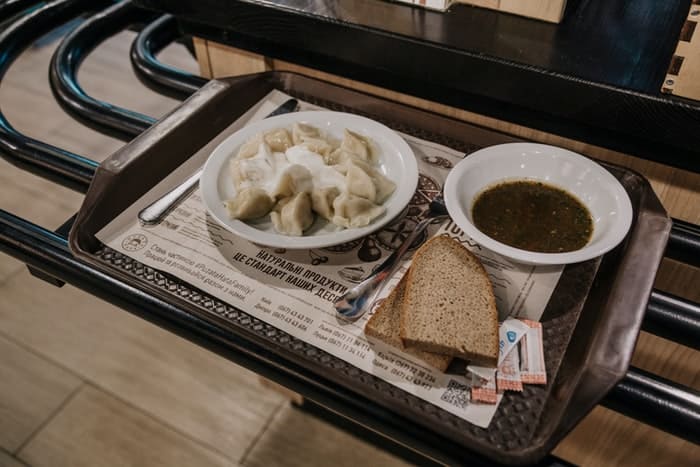While celiac disease is not well-known, it is a serious autoimmune disorder that affects approximately 1 in 133 Americans. For those with celiac disease, ingesting gluten can cause significant health problems, including malnutrition, intestinal damage, and even death. It’s no wonder, then, that people with celiac disease often require a gluten-free diet to prevent these health complications.

But what about prisoners? Do prisons have to provide gluten-free meals to inmates with celiac disease? The answer is yes. Under the Americans with Disabilities Act (ADA), prisons are required to provide reasonable accommodations to inmates with disabilities, which includes providing gluten-free meals to those who require them.
How Do Prisons Provide Gluten-Free Food?
Prison food is often thought of as being unhealthy and unappetizing. However, for prisoners with celiac disease or a gluten allergy, gluten-free food can be a lifesaver. In fact, all prisons in the United States are required to provide gluten-free food to inmates with celiac disease. This is because celiac disease is considered a disability under the Americans with Disabilities Act.
While the availability of gluten-free food varies from prison to prison, most prisons have a designated area where gluten-free food is stored and served. In addition, most prisons have staff who are knowledgeable about celiac disease and how to prepare gluten-free meals.
Challenges of Providing Gluten-Free Food in Prison
There is a growing demand for gluten-free food in prisons, as prisoners with celiac disease or gluten sensitivities struggle to find food that meets their dietary needs. While many prisons now have gluten-free options, these options are often inadequate and do not meet the needs of all prisoners who require a gluten-free diet. The challenges of providing gluten-free food in prison include: ensuring that all prisoners have access to appropriate food, sourcing ingredients that are gluten-free and affordable, and preparing food that meets the dietary needs of all prisoners.
Ensuring All Prisoners Have Access to Gluten-Free Meals
Many prisons are now offering gluten-free food options for inmates with celiac disease or gluten sensitivities, but ensuring that all prisoners have access to these meals is a challenge. One problem is that the gluten-free food items often cost more than the regular menu items, and prison budgets are often tight.
Some prisoners have reported feeling left out or stigmatized because they cannot eat the same food as their fellow inmates, and this can lead to tension and conflict. Ensuring that all prisoners have access to gluten-free food is a complex issue with many challenges, but it is important for the health and well-being of those who need it.
Most Prisons Do Not Have a Dedicated Gluten-Free Kitchen
The most significant challenge is that most prisons do not have a dedicated gluten-free kitchen. This means that celiacs and others who need a gluten-free diet have to rely on the regular prison kitchen, which is not always able to accommodate their needs. Often, the only gluten-free option available is a pre-packaged meal, which can be expensive and may not include all of the nutrients that someone on a gluten-free diet needs.
Sourcing Ingredients that Are Gluten-Free
One of the challenges to providing gluten-free food in prison is sourcing ingredients that are gluten-free. This can be difficult because a lot of foods that are normally gluten-free are not always available in prison. Another challenge is ensuring that the food is actually gluten-free. Some prisons have separate kitchens for preparing gluten-free food, but even then there is always a risk of contamination. Prison staff need to be properly trained in order to ensure that the food meets all of the dietary requirements for people with celiac disease or gluten sensitivity.
Prisons Do Not Have Staff Who Are Trained in Cooking Gluten-Free Food
In order to provide gluten-free food for inmates, prisons need staff who are trained in cooking gluten-free food. However, many prisons do not have the staff or money to provide this type of food. In some cases, the only gluten-free options available are bread and pasta. For inmates with celiac disease or a gluten sensitivity, these options are not enough. They need a variety of safe foods that are not made with wheat, barley, or rye.

Gluten Free Food in Prison: A Necessity or A Luxury?
Prison food is notoriously unhealthy, often consisting of processed meats, starches, and sugary drinks. So it’s no surprise that for inmates with celiac disease or gluten sensitivities, prison food can be a real nightmare. Unlike the general population, prisons don’t always have gluten free options for these inmates. And when they do, those options can be expensive and considered a luxury.
How Do Prisons Handle Special Dietary Needs?
There is a lot of debate surrounding prisons and the food they serve. In particular, many people are curious about whether prisons have gluten free food. The answer to that question is not a simple one, as different prisons handle dietary needs in different ways. Some prisons have gluten free food options, while others do not. It largely depends on the individual prison’s policies and procedures.
That said, most prisons are fairly accommodating when it comes to special dietary needs. If someone has a gluten allergy or intolerance, for example, the prison will generally try to provide them with food that does not contain gluten. This can be a challenge, especially if the prison is serving a standard meal that contains gluten. However, most prisons are willing to work with inmates who have special dietary needs to make sure they are able to eat safely and comfortably.
What Prisoners Can Do to Get Gluten Free Food?
Prisoners with Celiac disease or gluten intolerance often have a difficult time in prison getting the food they need to stay healthy. Gluten free food is not always readily available, and when it is, the cost can be prohibitive. However, there are things prisoners can do to get the food they need.
One option is to see if the prison has a gluten free diet option. If not, prisoners can petition the prison administration for a gluten free diet. They will need to provide medical documentation that shows they require a gluten free diet for health reasons.
If a gluten free diet is not an option, prisoners can try to bring their own gluten free food into prison with them. This can be difficult, as prisons often have strict rules about what inmates are allowed to bring in with them.
Another option is to work with their family members and friends to bring in food. This may help them get through the difficult time of being in prison.
Conclusion
In conclusion, prisons have begun to offer gluten free food options to inmates. While this may seem like a small gesture, it can have a big impact on the health and wellbeing of prisoners. Offering gluten free food can help to improve the quality of life for inmates with celiac disease or gluten sensitivity, and it can also help to reduce the number of gluten-related hospitalizations.








